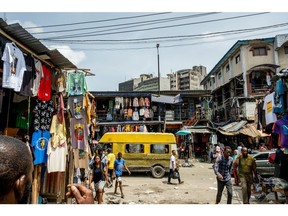
Article content
(Bloomberg) — Nigeria’s annual inflation slowed in April, shrugging off the impact of a currency slump and increasing the chance of another rate pause next week.
THIS CONTENT IS RESERVED FOR SUBSCRIBERS ONLY
Subscribe now to read the latest news in your city and across Canada.
- Exclusive articles from Barbara Shecter, Joe O'Connor, Gabriel Friedman, and others.
- Daily content from Financial Times, the world's leading global business publication.
- Unlimited online access to read articles from Financial Post, National Post and 15 news sites across Canada with one account.
- National Post ePaper, an electronic replica of the print edition to view on any device, share and comment on.
- Daily puzzles, including the New York Times Crossword.
SUBSCRIBE TO UNLOCK MORE ARTICLES
Subscribe now to read the latest news in your city and across Canada.
- Exclusive articles from Barbara Shecter, Joe O'Connor, Gabriel Friedman and others.
- Daily content from Financial Times, the world's leading global business publication.
- Unlimited online access to read articles from Financial Post, National Post and 15 news sites across Canada with one account.
- National Post ePaper, an electronic replica of the print edition to view on any device, share and comment on.
- Daily puzzles, including the New York Times Crossword.
REGISTER / SIGN IN TO UNLOCK MORE ARTICLES
Create an account or sign in to continue with your reading experience.
- Access articles from across Canada with one account.
- Share your thoughts and join the conversation in the comments.
- Enjoy additional articles per month.
- Get email updates from your favourite authors.
THIS ARTICLE IS FREE TO READ REGISTER TO UNLOCK.
Create an account or sign in to continue with your reading experience.
- Access articles from across Canada with one account
- Share your thoughts and join the conversation in the comments
- Enjoy additional articles per month
- Get email updates from your favourite authors
Sign In or Create an Account
or
Article content
Article content
Consumer prices rose 23.7% from 24.2% in March, according to data published by the National Bureau of Statistics on Thursday. Prices rose 1.86% in the month. The median estimate of five economists in a Bloomberg survey was 23.5%.
Article content
Article content
A more than 4% drop in the naira against the dollar since April, driven by a slump in the price of oil, Nigeria’s main export, was offset by cheaper gasoline and food costs increasing at a slower pace.
Article content
By signing up you consent to receive the above newsletter from Postmedia Network Inc.
Article content
Annual food inflation eased to 21.26% in April from 21.8% a month earlier and core price growth cooled to 23.39% from 24.4%.
Article content
The inflation reading may persuade policymakers, who have only four months of data to guide their decision, to pause the key interest rate for a second time in a row at a record 27.5% on May 20.
Article content
What Bloomberg Economics Says…
Article content
“Price gains will likely be sticky for the next several months as the moderating effect of cooler energy prices is countered by the inflationary impact of naira losses. We expect Nigeria’s central bank to hold rates when it meets later this month as policymakers wait for more clarity on the inflation outlook under the new CPI gauge.”
Article content
— Yvonne Mhango, Bloomberg Africa economist
Article content
To read more click here
Article content
The bureau overhauled the consumer price index for the first time in 16 years in January and changed the reference year to 2024.
Article content
Governor Olayemi Cardoso said Monday that inflation is still elevated and policymakers will continue their course of “orthodox policy that will see inflation moderate, and interest rates will follow as well.”
Article content
Sign up here for the twice-weekly Next Africa newsletter, and subscribe to the Next Africa podcast on Apple, Spotify or anywhere you listen.
Article content
Article content
—With assistance from Simon Lee.
Article content
(Updates with comment from Bloomberg Africa economist)
Article content

.jpg) 5 hours ago
1
5 hours ago
1
 English (US)
English (US)